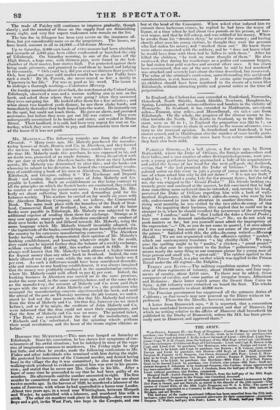HoWISoN THE 3Itnnanant.—This man was hanged on Saturday at Edinburgh.
Since his conviction, he has shown few symptoms of con- sciousness of his awful situation; but he indulged in none of the vaga- ries of imagination common to murderers. On Friday night lie slept but little, and when he awoke, made the following confessions to Mr. Fisher and other individuals who remained with him during the night. He protested his innocence of the Cramond murder, and denied having been in the village the day it was committed ; he also denied that the walking-stick produced in evidence against him was ever in his posses- sion ; and stated that he never saw Mrs. Geddes in his life. After a lapse of some time he proceeded to say that he had been guilty of six murders. He afterwards said the number amounted to eight. The first murder he committed was about four years ago, and the last one about twelve months ago. In the harvest of 1829, he murdered a labourer of the name of Jameson, with whom he had quarrelled in a house near Lauder. About two years ago, in a wood near Whittingham, between Morpeth and Wooler, he quarrelled with a labourer, and murdered him with a stick. The other six murders took place in Edinburgh—they were two boys and a girl, in the West Port, two boys in the Cowgate, and one boy at the bead of the .Canongate. When asked what induced him to commit these barbarous crimes,- he replied he had been the worse of liquor, at a time When 'he had about two pounds on his person, of har- vest wages, and that he fell asleep, and was robbed of his money. When he awoke from his "drunken sleep," he missed the money; and having shortly after seen his young victims, he thought they were the persona who had stolen his money, and "marked them out." He knew there were others connected with the robbery, and he " does not know what he would have done with them had he fallen in with them." After he killed the children, "he took no more thought of them." He also confessed, that during his wanderings as a pedlar and common beggar, he had stolen four gold watches and several silver ones. It has since been ascertained, that one of the men whom he said he had murdered was attacked and severely hurt about the time described, but recovered. The value of the criminal's confession, notwithstanding this accidental corroboration, is not, however, great. It seems quite impossible that six children should have been murdered in the streets of a town like Edinburgh, without attracting public and general notice at the time of perpetration.


























 Previous page
Previous page